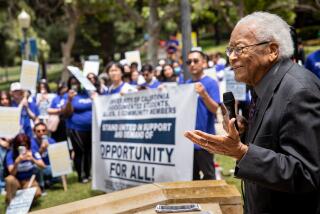The Importance of Happy Home Life for World Peace : BREAKING RANKS <i> by Melissa Everett (New Society Publishers: $34.95, cloth; 0-86571-134-8; $12.95, paper; 0-86571-135-6; 252 pp.) </i>
- Share via
A character in one of the summer’s big movie sequels recruits his henchmen by sidling up and murmuring, “Give me your pain.” They expel all their demons and then hew to him in loyal gratitude. In interviewing for “Breaking Ranks,” Melissa Everett displayed the same empathetic knack. Her 10 subjects are apostates from the American defense and intelligence establishments who confided in her their every religious, spiritual, sexual, professional and political crisis of conscience. If virtue really comes from living an examined life, the Holy Father himself has nothing on these guys.
Indeed, half of them are Catholics; whether lapsed, born-again, or true-blue is incidental. Each man felt compelled to reject nuclear deterrence, anti-Communist insurgency, or, in one case, the Strategic Defense Initiative. The book’s politics are unabashedly left wing. As a guide to world peace through living right and thinking good thoughts during bad Republican Administrations, “Breaking Ranks” is strictly for those who have already enlisted in the New Age army.
Not that it matters much when one is preaching to the choir, but ideologically charged distortions abound. Everett generously allows that “most of those currently employed in the U.S. national security establishment are not engaged in genocide” but refers to the Sandinistas’ forced relocation of an indigenous population only elliptically, as “the Miskito Indian question.” At least four times, workers and scientists in the weapons industries are compared, facilely and distastefully, to Nazis because they too “follow orders.”
Of course, so do the soldiers who have lately been demolishing missiles under the terms of 1988’s Intermediate-Range Nuclear Forces Treaty. A central tenet of Everett’s book is the illegitimacy of deterrence theory. Briefly praising INF, she mounts the highly dubious argument that it was “arguably hastened by the rise in citizen diplomacy and other forms of grass-roots pressure.” In fact, the treaty confirmed what 40 years of uneasy peace between the superpowers had already demonstrated: Deterrence works. Moscow would never have withdrawn its Euromissiles had NATO not deployed its own in the early 1980s--over the objections of the freeze movement that Everett so passionately praises. When the treaty was signed, the freeze movement had been dead for years, and arms control ranked well below drugs and crime in polls showing which issues mattered most to voters.
To Everett’s credit, her writing lacks the grim humorlessness of most extremist screeds. Errors aside, she has a good eye for descriptive detail and an ear for the telling quote. Several of her subjects are interesting to read about if not necessarily admirable in their actions or sentiments, including a brash, good-humored PR expert who parlayed a fudged resume all the way to a job flacking for Lawrence Livermore Laboratories only to decide he didn’t like nuclear weapons.
But most of these inexorable progressions toward total consciousness sound the same. A man becomes troubled, gets divorced, remarries, and then denounces the Pentagon. One Jesuit-educated ex-diplomat even discovers that with his new inner peace has come the ability to heal people, which makes it hard to credit his revelations about the absurdity of the system.
Another subject, Charlie Liteky, was an Army chaplain in Vietnam who was awarded the Medal of Honor in 1968 and returned it in care of the Vietnam Veterans Memorial in 1986 as an anti-Contras protest. Everett writes, “Ask (him) to tell you how his politics changed between his participation in the Vietnam War and his opposition to the one he saw as parallel in Central America, and he will probably tell you about his sex life.” This is the problem with Liteky, or indeed Everett, as a creditable analyst of our nation’s most controversial war. We learn that the padre lost his virginity to a Saigon prostitute but we do not learn what either he or the author thinks about the half-million people who have drowned in the South China Sea since 1975 trying to escape Communist Vietnam. Two million more people died in Cambodia. That the war radicalized and sexualized a chaplain or two pales somewhat in comparison to these catastrophic realities, neither of which Everett even bothers to mention.
The problem with this kind of book is precisely that our side is the only one on the couch. Everett was either unable or disinclined to journey to the jungles of western Cambodia for a good jaw-jaw with Pol Pot. “What was it?” she might have asked him. “Sour stomach? Mean father? Inflexible missionary? Why exactly did you kill a third of the people in the country?” Her world-peace-through-inner-peace formula does not leave enough room for factors such as historical enmity or plain old ideological and religious fanaticism.
When the diplomat-turned-psychic healer, John Graham, was posted to Libya in the ‘60s, Kadafi came to power the next year and expelled the Americans from the Air Force base where he was stationed. As negotiations with the Libyans over the details of the expulsion progressed, Graham says he became so distressed about the “anti-Yankee demonstrations” and the turmoil in his marriage that his inner pain began to sour the negotiations, which ultimately, though not surprisingly, failed.
“I realized,” Graham told Everett, “that the marriage was a microcosm for what was going on in Libya, or Libya was a macrocosm of what was going on in my own heart. . . .” It is easy to believe that the Red Army might have been chased out of Czechoslovakia if F.D.R. had felt better at Yalta, but hard to believe that friendly relations with one of the world’s most deadly fanatics would have endured if John Graham had had a happier home. Indeed, it is a heck of a guilt trip to lay on the former Mrs. Graham.
In Everett’s view, the U.S. defense establishment is just itching to go to war because of bad karma and greed for the defense dollar. This corrupt system works because those who work in it surrender their intellects and humanity in exchange for a paycheck and a sense of belonging. She suggests that if enough of them “just said no,” the system would collapse, and justly so. But are there men and women in defense and intelligence work who believe in what they are doing and can defend it eloquently? Yes, but not according to Everett’s formula. Are there people who believe that it would be bad if Communist regimes were consolidated in Nicaragua and Afghanistan and who are willing to fight and die to stop them? Yes, but not in the world of “Breaking Ranks.”
One does not have to agree with the choices Everett’s subjects made to appreciate their right to make them. But the author risks all credibility by attempting, in her two wrap-up chapters, to generalize about the psychological and quasi-religious impulses that prompted these anti-establishment conversions. She summons a legion of pro-peace psychobabblers in what is essentially an effort to fashion a behavioral science out of her political beliefs.
Marx mounted a similar kind of effort, and today we finally see the abject failure of his particular scientific model in the Soviet Union, Hungary, and Poland. In China, it can only be sustained at the points of 10,000 guns. Everett’s 10 men are admirable in their way, if it is admirable to follow your conscience wherever it may lead. Thankfully, as Everett admits, “they are mavericks,” since America would not be safe being led by such men unless the world miraculously became a far less treacherous place.
More to Read
Sign up for our Book Club newsletter
Get the latest news, events and more from the Los Angeles Times Book Club, and help us get L.A. reading and talking.
You may occasionally receive promotional content from the Los Angeles Times.










